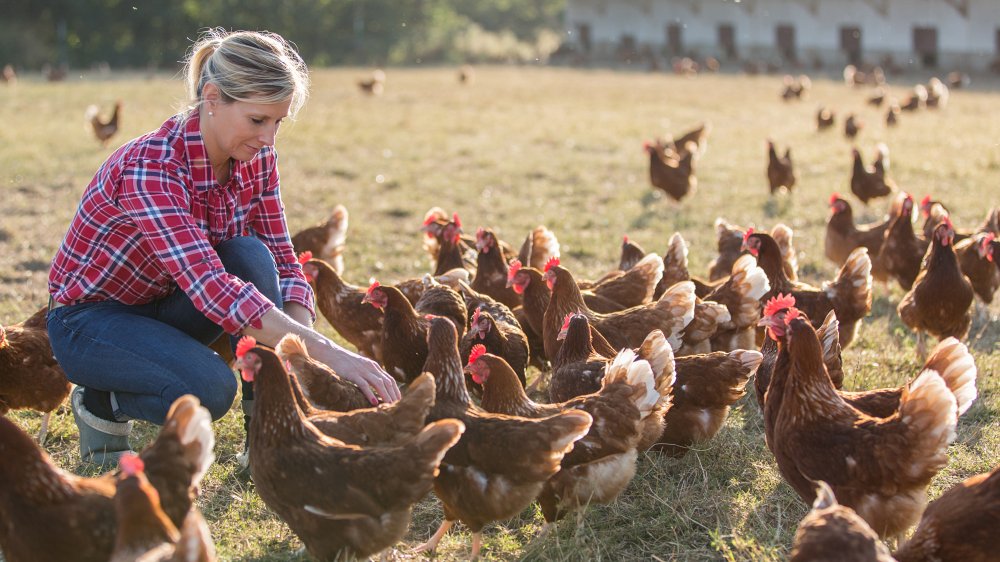How America's Eggs Are Different From The Rest Of The World's
If you've never traveled outside of the US, chances are you didn't even know American eggs are different from eggs sold in other countries. According to the Huffington Post, this is due to a variety of factors such as how the chickens are raised and the rules surrounding how eggs are processed before they can be sold. These methods can lead to distinct differences in the eggs' appearance, like paler-colored yolks, and determine whether or not the eggs must be refrigerated. Because of these differences, many people assume that American eggs are inferior to eggs from other countries.
The Huffington Post states that, in general, eggs from America are similar nutritionally to eggs from anywhere else, but they do have different characteristics. Author Michael Ruhlman says that an egg's yolk color is determined by what food the hen is eating and what nutrients it is receiving when it lays the egg. Many large scale egg production facilities in the US feed their chickens cheap grain and corn mixed with supplements and antibiotics to keep them healthy, instead of feeding them a more balanced and higher-quality diet. This grain and corn diet causes pale yellow yolks. Drake Patten, the owner of 48-acre conservation farm Hurricane Hill in Rhode Island, said that while the supplements added to the diets of chickens on these massive farms will keep them alive and producing eggs, it is not as good for them as access to an outdoor area and diverse food.
Most mass-produced food is going to be lower quality, regardless of where it is made
Are produced in Europe or other countries than the United States better overall? Ruhlman told the Huffington Post, "If it's mass-produced, it's probably just as unhealthy as the mass-produced food here in America" and that actual differences between eggs the United States and elsewhere are likely very small to nonexistent. However, Ruhlman says that "Europeans have access to higher-quality food in general if they want" than people living in the US, which means they have more opportunities to buy better eggs at affordable prices. Patten agrees, stating, "I wouldn't say that a European egg is necessarily better, but where that egg comes from, whether it's in Europe or America, is likely to give you a better egg."
In many other countries, it is even illegal to sell washed eggs like the ones produced in the US. NPR states that this is because the method strips off a layer that naturally protects eggs from harmful bacteria and prevents them from spoiling at room temperature. Yi Chen, a food scientist at Purdue University, also says that washing off this coating makes the shells more prone to cracking.
The US is one of only a few countries who refrigerate eggs
So why must producers in the US bathe their eggs? Patten informed the Huffington Post, "The goal of egg production in large scale facilities is to get as many eggs produced in as short of a period of time as possible." Due to the large number of birds in each barn, it is not feasible to inspect every chicken for health issues, which leads to some eggs becoming dirty. NPR says that in some European countries hens are vaccinated against Salmonella, a big health concern for many egg producers.
In the US, it is not mandatory to vaccinate chickens, but all eggs must be washed. Vincent Guyonnet, poultry veterinarian and scientific adviser to the International Egg Commission, said the two methods are "different approaches to basically achieve the same result." While neither technique is necessarily better, eggs produced by vaccinated hens can be kept at room temperature while washed eggs must be kept refrigerated. This is why you'll find eggs for sale right on the shelf in grocery stores around the world instead of in the refrigerated section. NPR states that in addition to the US, Scandinavia, Japan, and Australia still wash and refrigerate their eggs.


